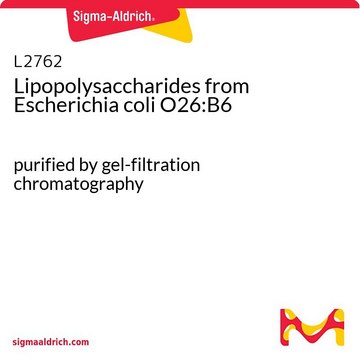L3880
Lipopolysaccharide aus Escherichia coli O127:B8
purified by trichloroacetic acid extraction
Synonym(e):
LPS
Anmeldenzur Ansicht organisationsspezifischer und vertraglich vereinbarter Preise
Alle Fotos(1)
About This Item
Empfohlene Produkte
Biologische Quelle
Escherichia coli (O127:B8)
Qualitätsniveau
Form
lyophilized powder
Aufgereinigt durch
trichloroacetic acid extraction
Verunreinigungen
1-10% Protein (Lowry)
Versandbedingung
ambient
Lagertemp.
2-8°C
Suchen Sie nach ähnlichen Produkten? Aufrufen Leitfaden zum Produktvergleich
Allgemeine Beschreibung
This product is TCA extracted from E. coli serotype O127:B8. The source strain is ATCC 12740. This LPS serotype has been used in the study of septic shock and to induce NOS in murine macrophages and PAF synthesis in rat glomerular masangial cells.
Anwendung
Lipopolysaccharide (LPS) sind charakteristische Bestandteile der Zellwand von gramnegativen Bakterien. LPS und seine Lipid-A-Gruppe stimulieren Zellen des angeborenen Immunsystems durch den Toll-like-Rezeptor 4 (TLR4). TLR4 gehört zur Toll-like-Rezeptor-Proteinfamilie, die häufige Pathogen-assoziierte molekulare Strukturen (PAMPs) erkennt.
Biochem./physiol. Wirkung
Lipopolysaccharides (LPS) are localized in the outer layer of the membrane and are, in noncapsulated strains, exposed on the cell surface. They contribute to the integrity of the outer membrane, and protect the cell against the action of bile salts and lipophilic antibiotics.
Angaben zur Herstellung
The product is soluble in water (5 mg/ml) or cell culture medium (1 mg/ml) yielding a hazy, faint yellow solution. A more concentrated, though still hazy, solution (20 mg/ml) has been achieved in aqueous saline after vortexing and warming to 70-80 oC. Lipopolysaccharides are molecules that form micelles in every solvent. Hazy solutions are observed in water and phosphate buffered saline. Organic solvents do not give clearer solutions. Methanol yields a turbid suspension with floaters, while water yields a homogeneously hazy solution.
Sonstige Hinweise
To gain a comprehensive understanding of our extensive range of Lipopolysaccharides for your research, we encourage you to visit our Carbohydrates Category page.
Ähnliches Produkt
Produkt-Nr.
Beschreibung
Preisangaben
Signalwort
Danger
H-Sätze
Gefahreneinstufungen
Acute Tox. 2 Oral
Lagerklassenschlüssel
6.1A - Combustible acute toxic Cat. 1 and 2 / very toxic hazardous materials
WGK
WGK 3
Flammpunkt (°F)
Not applicable
Flammpunkt (°C)
Not applicable
Hier finden Sie alle aktuellen Versionen:
Besitzen Sie dieses Produkt bereits?
In der Dokumentenbibliothek finden Sie die Dokumentation zu den Produkten, die Sie kürzlich erworben haben.
Kunden haben sich ebenfalls angesehen
Shiu-Ming Kuo et al.
The Journal of nutrition, 135(10), 2411-2416 (2005-09-24)
Sublethal exposure to Escherichia coli endotoxin [lipopolysaccharide (LPS)] attenuates the lethal effects of subsequent insults associated with oxidative stress, such as higher LPS dose, septic peritonitis, and ischemia. Because administration of the antioxidant ascorbate protects against these same insults and
Mandakh Bekhbat et al.
Brain, behavior, and immunity, 76, 248-257 (2018-12-15)
Adversity during development is a reliable predictor of psychiatric disorders such as depression and anxiety which are increasingly recognized to have an immune component. We have previously demonstrated that chronic adolescent stress (CAS) in rats leads to depressive-like behavior in
Claudia Patrignani et al.
Journal of inflammation (London, England), 7, 16-16 (2010-04-01)
PTPH1 is a protein tyrosine phosphatase expressed in T cells but its effect on immune response is still controversial. PTPH1 dephosphorylates TCRzeta in vitro, inhibiting the downstream inflammatory signaling pathway, however no immunological phenotype has been detected in primary T
F Dhainaut et al.
Vox sanguinis, 104(2), 115-126 (2012-09-26)
To compare in vitro and in vivo biological and biochemical properties of five liquid intravenous immunoglobulin (IVIg) preparations licensed for therapeutic use in Europe. ClairYg(®) was compared in a blinded manner to four other liquid IVIg preparations licensed in Europe
Hong Li et al.
International journal of biological sciences, 16(7), 1107-1120 (2020-03-17)
Traumatic brain injury (TBI) induces an acute inflammatory response in the central nervous system that involves both resident and peripheral immune cells. The ensuing chronic neuroinflammation causes cell death and tissue damage and may contribute to neurodegeneration. The molecular mechanisms
Unser Team von Wissenschaftlern verfügt über Erfahrung in allen Forschungsbereichen einschließlich Life Science, Materialwissenschaften, chemischer Synthese, Chromatographie, Analytik und vielen mehr..
Setzen Sie sich mit dem technischen Dienst in Verbindung.


